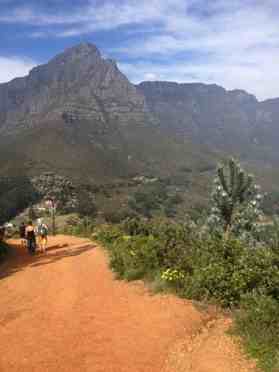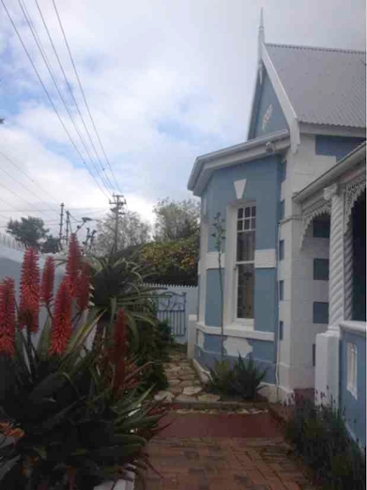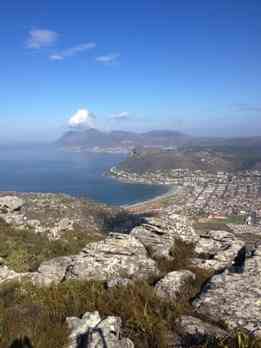Economics in Cape Town: McGill Lawrence Internship Award, Sarah Brauner

Sarah Brauner, junior economics/mathematics major, received a McGill Lawrence Internship award to spend her summer in Cape Town, South Africa working at the Economic Policy Research Institute.
This summer has been a story of disparate images and experiences, and as I sit down to write this post, its hard not to be daunted by the task of stringing them together into a cohesive narrative. In fact, the more I reflect, the more it seems that the thread holding all that I wish to convey together is a series of sharp contrasts that I have borne witness to, participated in, and attempted—with mixed success—to process.
The backdrop for all this—Cape Town, South Africa—is in some ways one of the most beautiful places I have ever been. Table Mountain, one of the Seven Wonders of the World, is visible from almost every vantage point in the metropolitan area, and beaches (apparently the setting for Shark Week) surround the city. Eucalyptus and palm trees, British-colonial architecture, striking panoramas and even Baboons, abound.
But Cape Town is also one of the most disturbing places I’ve been, with a legacy of hate and inequity that tinges even its most breathtaking panoramas. It was, after all, only 2 decades ago that Apartheid, the political regime that legally segregated blacks, whites and “coloureds” (people of mixed descent that generally speak Afrikaans), was dismantled after 46 years of being in power. And while almost every South African I spoke to referred to 1994 and the democratic election of Nelson Mandela as the moment they and their country became “free,” the economic and social indicators—of which I was tasked with researching and measuring—have been far less hopeful. Since the fall of Apartheid, unemployment rates have risen steadily each year, with the burden almost entirely upon the poor: the top income decile in South Africa enjoys an unemployment rate of 4%. Moving to the lowest income decile, that rate skyrockets to 70. Measures of inequality reflect an equaling disturbing picture; at .63 (as of 2009), South Africa’s Gini coefficient is one of the highest in the world, and though there is a small and slowly growing black middle class, a disproportionate number of impoverished people are of color. 95% of those living under the poverty line are black.
The thing is, even if I hadn’t researched these statistics as part of my internship, the vast disparity in well being between white and nonwhite is omnipresent. Cape Town is a city of islands, each with fancy stores, restaurants, and sprawling mansions—and surrounded by vast swatches of human suffering.

Never before have I seen such immense poverty stand in so close a proximity to such immense wealth. The houses in the central areas of the city are picturesque, and yet they are inevitably surrounded by barbed wire, electric fences, and the insignia of a private security company—one of South Africa’s fastest growing industries.
Meanwhile, an overwhelming majority of non-whites live several hours from central Cape Town in the “townships” (slums) that their ancestors were forcibly relocated to during Apartheid. The townships, which are often without electricity, running water or streetlights, are a breeding ground for violence, rape and disease.

Being a bystander and (involuntary) complicit actor to the astounding levels of inequality was one of the hardest parts of my summer. It was hard not to provoke fights when white South Africans complained to me about how affirmative action made it difficult for white men to find jobs or when I talked to people whose threshold for not being considered racist was “knowing some really smart black people”; hard to know how to react when I saw myself being treated preferentially because of my whiteness; hard to watch wealthy couples yell at the children begging for food outside of my local grocery store for not being in school.
to fear at the impossibility of the problems we were facing and the indirectness of my role in it all.Then there was my internship at the Economic Policy Research Institute (EPRI)—my feelings towards which oscillated consistently from being awed at the directness of my involvement in the think-tank’s goings-on,
There was ample indirectness—of being in South Africa and yet working primarily in an office; of working alongside brilliant and passionate people that had also traveled far distances to work in Cape Town; of attempting to combat, with these people in this office, a type of far-reaching and deeply entrenched poverty that none of us had ever directly experienced. And yet, I was simultaneously struck by how direct an impact the work that I was doing would have on the projects I was assisting. For an unconditional cash transfer project in Nigeria, I designed the registration and enrollment forms and process that would allow girls in Sokoto and Niger to receive money towards their schooling. In a project that explored micro-insurance packages for Orphans and Vulnerable children, I was a co-author of one of the reports; in a project that evaluated and attempted to improve upon South Africa’s public works program, I was both a co-author of a contextual literature review and the designer of the randomized site-selection process.
Despite the surprisingly high level of responsibility that I had as an intern, I was accompanied by a nagging worry throughout the internship that the projects themselves were not enough; that the policy makers and NGOs we were working alongside were too corrupt and apathetic to sufficiently fight the overwhelming poverty, lack of health and educational resources and non-existent risk coping mechanisms that are a reality to so many; that there was so much bureaucracy and inefficiency on the ground that despite the project’s lofty ideals and motives, none of it would make a difference. Realistically, that isn’t fair—despite bad data, corrupt street level bureaucrats and the remoteness of most of the locations where the projects occurred, they did make a tangible positive impact (one of the things, among many, that EPRI measures).
But I also witnessed things that gave me good reason to worry. Most notably, at a two-week course that EPRI organizes, which teaches African policy makers about implementing and evaluating social protection, I watched as policy makers sat in a 5-star hotel in downtown CapeTown, casually discussing HIV treatment or cash transfers as they ate catered meals. When some of the interns pointed out this seeming hypocrisy, we were told that this was the only way the policy makers with the power to effect real change would bother to come to the event or learn about social protection. This is just one of multiple examples, and over my eight weeks at EPRI, I became increasingly aware that despite the academic revolution in international development that has occurred in the past decade—which rejects policies and causes that lack rigorous empirical evidence espousing their effects—the type of officials that actually wind up implementing anti-poverty policies don’t value dignified statistical tests so much as they do political capital.
It was a tumultuous, at times frustrating, disheartening, and throughout incredibly valuable 8 weeks. While I am still attempting to sift through all that I saw and did, what is clear to me is how informative—even eye-opening—these disparate narratives have been, even if they don’t neatly weave themselves into one cohesive story.
Tags: mcgill lawrence, policy, research, internship, inequality, summer, international travel, apartheid, economics
